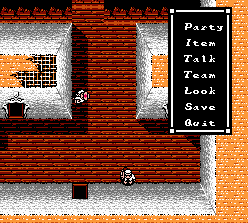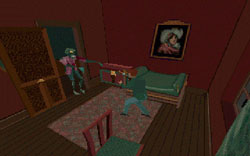Survival horror
Survival Horror
Survival horror is a subgenre of video games that emphasizes survival, resource management, and a sense of fear or dread. This genre often involves players navigating through hostile environments, solving puzzles, and confronting terrifying adversaries, all while managing limited resources such as ammunition, health, and tools.
History[edit | edit source]
The origins of survival horror can be traced back to the early 1980s, with games like "Haunted House" for the Atari 2600 and "Sweet Home" for the NES. However, the genre gained significant popularity with the release of "Resident Evil" in 1996, which established many of the conventions now associated with survival horror.
Gameplay Elements[edit | edit source]
Survival horror games typically feature:
- Limited Resources: Players must carefully manage scarce resources, such as ammunition and health packs, to survive.
- Puzzle Solving: Many games include puzzles that must be solved to progress, adding an element of strategy and critical thinking.
- Atmosphere and Storytelling: A strong emphasis is placed on creating a tense and immersive atmosphere, often through detailed environments and compelling narratives.
- Combat and Evasion: Players often have the option to fight or flee from enemies, with combat being a last resort due to limited resources.
Notable Games[edit | edit source]
Some of the most influential survival horror games include:
- "Resident Evil" series
- "Silent Hill" series
- "Amnesia: The Dark Descent"
- "Dead Space" series
- "The Last of Us"
Influence and Legacy[edit | edit source]
Survival horror has influenced a wide range of media, including films, literature, and other video game genres. The tension and fear elements have been incorporated into action-adventure games, leading to hybrid genres such as action horror.
Also see[edit | edit source]
Transform your life with W8MD's budget GLP1 injections from $125
W8MD offers a medical weight loss program NYC and a clinic to lose weight in Philadelphia. Our W8MD's physician supervised medical weight loss centers in NYC provides expert medical guidance, and offers telemedicine options for convenience.
Why choose W8MD?
- Comprehensive care with FDA-approved weight loss medications including:
- loss injections in NYC both generic and brand names:
- weight loss medications including Phentermine, Qsymia, Diethylpropion etc.
- Accept most insurances for visits or discounted self pay cost.
- Generic weight loss injections starting from just $125.00 for the starting dose
- In person weight loss NYC and telemedicine medical weight loss options in New York city available
- Budget GLP1 weight loss injections in NYC starting from $125.00 biweekly with insurance!
Book Your Appointment
Start your NYC weight loss journey today at our NYC medical weight loss, and Philadelphia medical weight loss Call (718)946-5500 for NY and 215 676 2334 for PA
Search WikiMD
Ad.Tired of being Overweight? Try W8MD's NYC physician weight loss.
Semaglutide (Ozempic / Wegovy and Tirzepatide (Mounjaro / Zepbound) available. Call 718 946 5500.
Advertise on WikiMD
|
WikiMD's Wellness Encyclopedia |
| Let Food Be Thy Medicine Medicine Thy Food - Hippocrates |
Translate this page: - East Asian
中文,
日本,
한국어,
South Asian
हिन्दी,
தமிழ்,
తెలుగు,
Urdu,
ಕನ್ನಡ,
Southeast Asian
Indonesian,
Vietnamese,
Thai,
မြန်မာဘာသာ,
বাংলা
European
español,
Deutsch,
français,
Greek,
português do Brasil,
polski,
română,
русский,
Nederlands,
norsk,
svenska,
suomi,
Italian
Middle Eastern & African
عربى,
Turkish,
Persian,
Hebrew,
Afrikaans,
isiZulu,
Kiswahili,
Other
Bulgarian,
Hungarian,
Czech,
Swedish,
മലയാളം,
मराठी,
ਪੰਜਾਬੀ,
ગુજરાતી,
Portuguese,
Ukrainian
Medical Disclaimer: WikiMD is not a substitute for professional medical advice. The information on WikiMD is provided as an information resource only, may be incorrect, outdated or misleading, and is not to be used or relied on for any diagnostic or treatment purposes. Please consult your health care provider before making any healthcare decisions or for guidance about a specific medical condition. WikiMD expressly disclaims responsibility, and shall have no liability, for any damages, loss, injury, or liability whatsoever suffered as a result of your reliance on the information contained in this site. By visiting this site you agree to the foregoing terms and conditions, which may from time to time be changed or supplemented by WikiMD. If you do not agree to the foregoing terms and conditions, you should not enter or use this site. See full disclaimer.
Credits:Most images are courtesy of Wikimedia commons, and templates, categories Wikipedia, licensed under CC BY SA or similar.
Contributors: Prab R. Tumpati, MD






